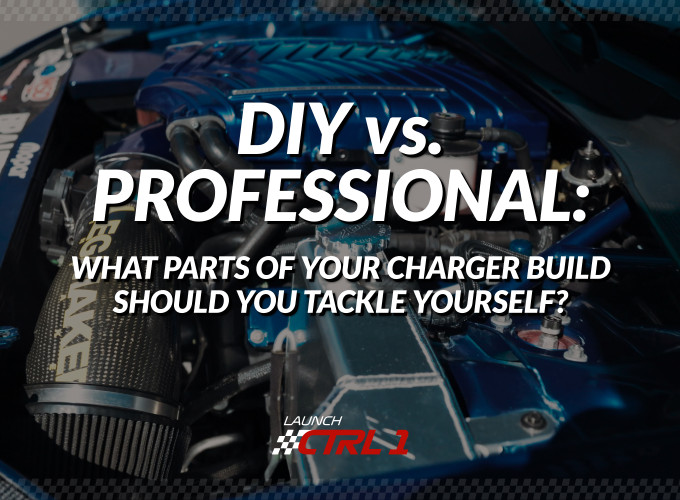When it comes to modifying your Dodge Charger, one of the biggest decisions you'll face is determining what work to do yourself and what to leave to the professionals. In our recent Charging Forward interview with Jose Juarez (@392indigoblue2.0), owner of a 950hp Whipple-supercharged Scat Pack Widebody, we gained valuable insights into this very question.
Jose's build represents years of both DIY work and professional collaboration, making him the perfect source for practical advice on where to draw the line between garage projects and shop visits.
Start Small and Build Your Confidence
"Start small. You can start with like a cold air intake. You want to get a axle-back exhaust. Those are some of the stuff that usually you can do yourself. 5-10 minute job," Jose advised during our conversation.
This approach makes perfect sense. Most modifications on modern Chargers don't require specialized tools or knowledge:
-
Cold air intakes: Generally bolt-on with basic hand tools
-
Exhaust components: Mid-muffler deletes and axle-backs are straightforward
-
Cosmetic upgrades: Vinyl wraps, taillight tints, and badge swaps
Jose emphasized that "everything on the car is nuts and bolts," which means most exterior and simple performance mods are within reach of an average DIYer with basic tools and YouTube tutorials.
Getting Your Hands Dirty Builds Knowledge
One clear message from Jose was the importance of hands-on experience: "You need to get your own hands dirty. Just start with basics. Learn how to do your tires, learn how to change your oils, do basic tune-ups, spark plugs, cables, whatever the case may be, because that will set a foundation for you."
This foundation of mechanical knowledge pays dividends when you:
-
Need to troubleshoot issues
-
Communicate with shops about more complex work
-
Understand how different systems interact
-
Make informed purchasing decisions
Even if you eventually have a shop handle more complex mods, having this baseline knowledge helps you become a more informed customer who can't easily be taken advantage of.
When to Call in the Professionals
While Jose did plenty of work himself, he was clear about knowing when to seek professional help. His relationship with Yellow Jacket Tuning is a testament to the value of finding the right shop for specialized work.
Consider professional help for:
Engine Internal Work For Jose's 950hp build, Yellow Jacket Tuning handled all the internal engine modifications—heads, pistons, rods, cams—along with proper tuning. "If you didn't go to tune school, don't do it," Jose warned about DIY tuning attempts.
Supercharger Installation While physically installing a supercharger might be possible for advanced DIYers, the tuning that follows requires professional equipment and expertise. Jose had TPS Motorsports handle his initial Whipple install before Yellow Jacket perfected the tune.
Fabrication Work Jose's custom roll cage came from Studio RSR in LA. Anything requiring welding or precision fabrication typically demands professional skills and equipment.
Transmission Builds Jose's transmission was professionally built to handle the massive power increase—not something you want to tackle in your garage without specialized knowledge.
The Cost-Benefit Analysis
One of Jose's most repeated pieces of advice was: "Do it right the first time."
"Spend the money. 'Cause if you take shortcuts, you get an inferior product," he explained. "It's going to be twice as expensive. Once it breaks, you gotta redo it."
This philosophy should guide your DIY vs. professional decisions. Consider:
-
Tool investment: Will you need expensive specialized tools you'll rarely use again?
-
Time commitment: Is the learning curve worth it for a one-time mod?
-
Risk factor: What are the consequences if something goes wrong?
-
Warranty considerations: Will DIY work void warranties on related components?
Money-Saving Approaches Without Cutting Corners
Jose found clever ways to save money without compromising quality:
Research and Patience "The carbon fiber side skirts, mirror caps... Got it off of Amazon. I took a gamble and it paid off," Jose mentioned about some carbon fiber pieces that were significantly cheaper than name-brand alternatives.
Partial DIY For some projects, Jose did prep work himself, then had professionals handle the final critical stages. This hybrid approach can save labor costs while ensuring proper execution.
Building Relationships Jose's sponsorship with Braum got him "everything half off." Building relationships with shops and brands can lead to discounts and support—something that happens naturally when you become a repeat customer.
Setting Up Your DIY Workspace
If you're serious about tackling Charger mods yourself, invest in:
-
Quality basic tools: Complete socket sets, torque wrenches, and screwdriver sets
-
Jack and jack stands: Never work under a car supported only by a jack
-
Workspace lighting: Can't fix what you can't see
-
Digital multimeter: Essential for electrical troubleshooting
-
Shop manual or online subscription: Factory service information is invaluable
Finding the Right Balance
Jose's Charger represents an ideal balance between DIY pride and professional expertise. He handles what he can—interior modifications, basic maintenance, some cosmetic upgrades—while trusting experts with critical performance components.
As he put it: "If it's something on the car that I need to modify and if I can do it myself, I'll do it myself. If it's something that's too risky, it's like, let me have a professional do it."
This balanced approach has resulted in a 950hp daily-drivable monster that's both personalized and properly built—proof that knowing when to DIY and when to seek help is the true key to a successful build.
Whether you're just starting with your Charger or planning major modifications, remember that the journey is as rewarding as the result. As Jose emphasized throughout our conversation, the car community is generally helpful and willing to share knowledge—don't be afraid to ask questions and learn from those who've already walked the path.
Want more insights from Jose's incredible Charger build? Check out our full Charging Forward interview on your favorite podcast platform!
Apple Podcast - Charging Forward
Spotify - Charging Forward

